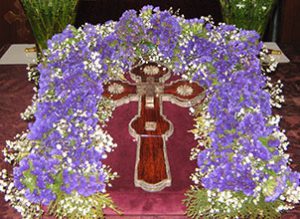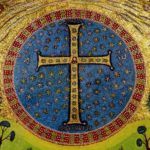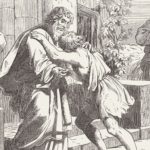“Блаженны кроткие, ибо они наследуют землю”
Во имя Отца и Сына и Св. Духа.
Братья и сестры, сегодня мы поговорим о третьей заповеди Блаженства:
«Блаженны кроткие, ибо они наследуют землю» (Матф. 5, 5)
Что такое кротость? – это качество, противоположное гневливости. Кроткий человек – тот, кто способен переносить оскорбления спокойно, не раздражаясь.
Способность гневаться вложена в нашу душу Создателем Богом, и это очень важная способность души. Но в падшем состоянии человека сила раздражительности приобрела ложное направление, так же как и другие душевные силы.
Приведу такой пример: чувство голода нам необходимо. Если бы мы не чувствовали голод, то мы бы обходились без пищи, пока не упали бы от истощения. Но в падшем состоянии желание пищи приобрело ненормальный, страстный характер: отсюда – обжорство, лакомство.
Так и сила раздражительности вложена в нашу природу для полезной цели, но если мы даем ей ложное направление, она становится пагубной.
Какое же употребление гнева правильное, естественное?
Гнев вложен в нашу душу Создателем для защиты от всего греховного, нечистого, безнравственного. Мы должны гневаться на греховные мысли, которые нам внушают нечистые духи, чтобы увлечь нас на грех и удалить от Бога. Мы должны негодовать на все, что противно заповедям Божиим.
Если грех, несправедливость, подлость не вызывают негодования в сердце человека, то это большой недостаток характера. Такой человек равнодушен к добру и ко злу. Он не восхищается благородными поступками и не негодует о подлых поступках. Такое безразличное состояние отвратительно пред Богом.
В Апокалипсисе Господь говорит: «… знаю твои дела; ты ни холоден, ни горяч; о, если бы ты был холоден, или горяч! Но, как ты тепл, а не горяч и не холоден, то извергну тебя из уст Моих» (Откр.3:15-16).
Равнодушие и теплохладность типична для нашего времени.
Господь с гневом обличал фарисеев, как сказано в Евангелии, «скорбя о ожесточении сердец их» (Марк. 3,5). Он обличал их не с ненавистью, а со скорбью о их погибельном состоянии.
Нужно уметь отделять человека, который грешит, от его греха. Мы должны негодовать на грех, как в себе, так и в других. Однако, если наш ближний делает нечто греховное, мы должны негодовать на грех, но не на самого человека. К человеку нужно относиться всегда с любовью. Вспомним, что Господь Иисус Христос скорбел о Иуде на Тайной вечери.
Но у нас раздражительность очень часто получает противоестественное направление, когда мы гневаемся на ближних из-за чего-либо житейского.
Господь говорит в Нагорной проповеди: «всякий, гневающийся на брата своего напрасно, подлежит суду» (Матф. 5,22). Что означает это слово «напрасно»? – Очень сильное толкование на эти слова Христовы мы находим в древнем патерике:
Брат спросил Старца: «Что значит: гневаться на брата своего напрасно?».
– Старец отвечал: «Даже если бы брат выколол у тебя правый глаз или отсек тебе правую руку, и ты стал бы на него гневаться – ты гневался бы на него напрасно. Тогда только гневайся на брата, если он будет удалять тебя от Бога».
Заповеди блаженств находятся в связи между собой, как ступени духовной лестницы. Первые две заповеди: «Блажени нищие духом» и «блажени плачущие» указывают на смирение и покаяние. Гнев питается от гордости, т.е высокого мнения о себе, поэтому, очевидно, что смирение и покаяние производят кротость.
Как и прочие духовные добродетели, кротость – это дар Св. Духа. Но мы должны понуждать себя к кротости и бороться с раздражительностью, чтобы получить Божию помощь. Помощь дается тем, кто сам трудится и понуждает себя к добродетели.
Учитель кротости – Сам Господь Иисус Христос. Он говорит: «Научитеся от Мене, яко кроток есмь и смирен сердцем, и обрящете покой душам вашим». (Матф. 11)
Аминь
Еп. Андрей
“Blessed are the meek, for they will inherit the earth”
In the name of the Father and of the Son and of the Holy Spirit.
Brothers and sisters,
Today we will talk about the third commandment of Blessedness:
“Blessed are the meek, for they will inherit the earth”. (Matth. 5:5)
What is meekness? Meekness is a capacity that is antipathetic to anger. A meek person is one who is able to bear insults calmly, without being irritated.
The ability to be angry is implanted into our soul by our Creator and is a very important and necessary emotion. But in the fallen state of Man, this ability took a wrong direction, just like other abilities of the soul.
Here is an example: the feeling of hunger we have is indispensable. If we didn’t feel hungry, we would go without food until we collapsed from exhaustion. So, a feeling of hunger is vital for life. However, natural hunger may turn into an unnatural craving: gluttony, hedonism.
Likewise, our soul has been embedded by our Creator with an inborn aptitude to get angry – but for a beneficial design. However, if we apply it incorrectly, it becomes destructive.
So, what is the correct and natural use of anger?
Anger is implanted into our soul by the Creator for protection against everything sinful, unclean and immoral. We must be angry at sinful thoughts, which the demons instill into us – so as to lead us away from God. We should resent everything that goes against God’s commandments.
If sin, injustice or baseness does not cause indignation in a person’s heart, then there is a big flaw in that person’s character. Such a person is indifferent to both good and evil. He doesn’t admire noble deeds and doesn’t resent vile acts. Such an indifferent spiritual state is an abomination before God.
In the Apocalypse, the Lord says: “I know your deeds; you are neither cold nor hot. How I wish you were one or the other! So, because you are lukewarm—neither hot nor cold—I am about to vomit you out of My mouth!” (Rev. 3:15-16).
Indifference and lukewarmness is typical of our times.
The Gospel tells us that our Lord censured the Pharisees with anger: “He looked round about on them with anger, being grieved for the hardness of their hearts” (Mark 3,5). He denounced them without hatred but with sorrow because of their spiritual blindness.
We must learn how to separate a person who is sinning – from his sin. We must resent sin, both in ourselves and in others. However, if our neighbour is doing something sinful, we must resent the sin but not the person himself. We should always treat all people with love.
Let us recall how our Lord Jesus Christ was grieving for Judas at the Last Supper.
However, our irritability is often misdirected toward an unnatural course, when we get angry at our neighbour over earthly matters.
The Lord says in the Sermon on the Mount: “I say unto you, that whosoever is angry with his brother without a cause shall be in danger of the judgment.” (Math. 5, 22).
What does this mean: “without a cause”?
We find a powerful commentary on this passage in the ancient Patericon:
A brother asked the Elder: “What does it mean: to be angry with your brother ‘without a cause’?”
The Elder answered – “Even if a brother put out your right eye or cut off your right hand, and you would become angry with him – you would be angry with him without a cause. If he will lead you away from God, only then should you be angry with your brother”.
The commandments of blessedness are inter-related like rungs on a Christian spiritual ladder.
The first two commandments: “Blessed are the poor in spirit” and “blessed are they who mourn” indicate humility and repentance. As anger is fed by pride i.e. being highly self-opinionated, it’s obviously clear that humility and repentance produce meekness.
Like all other spiritual virtues, meekness is a gift of the Holy Spirit. But in order to receive God’s grace, we must compel ourselves to be meek and to struggle with irritability.
The perfect teacher of meekness is our Lord Jesus Christ, Who says: “Learn from Me, for I am meek and humble in heart, and you will find rest for your souls…” (Mat. 11).
Amen.
Bishop Andrei










